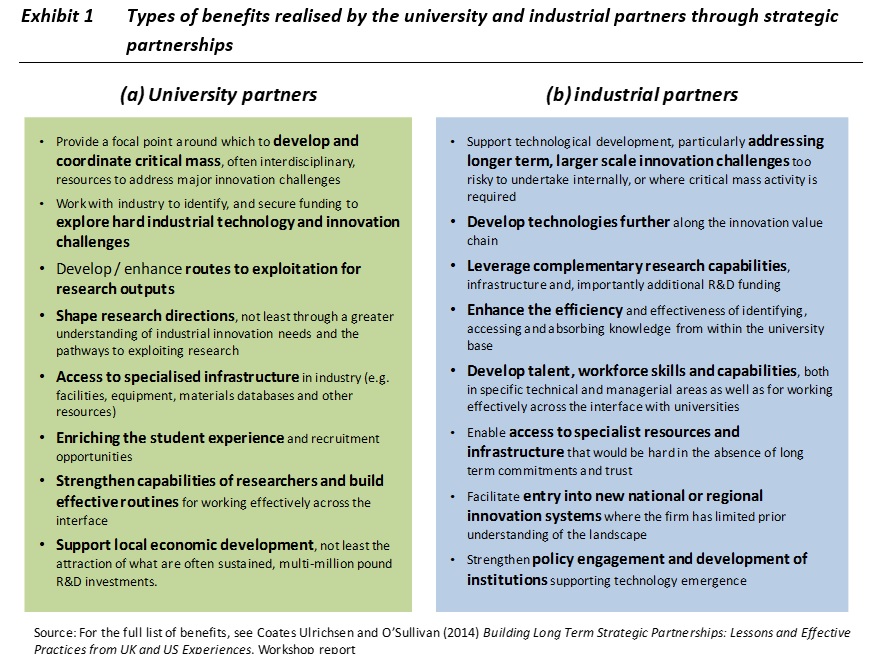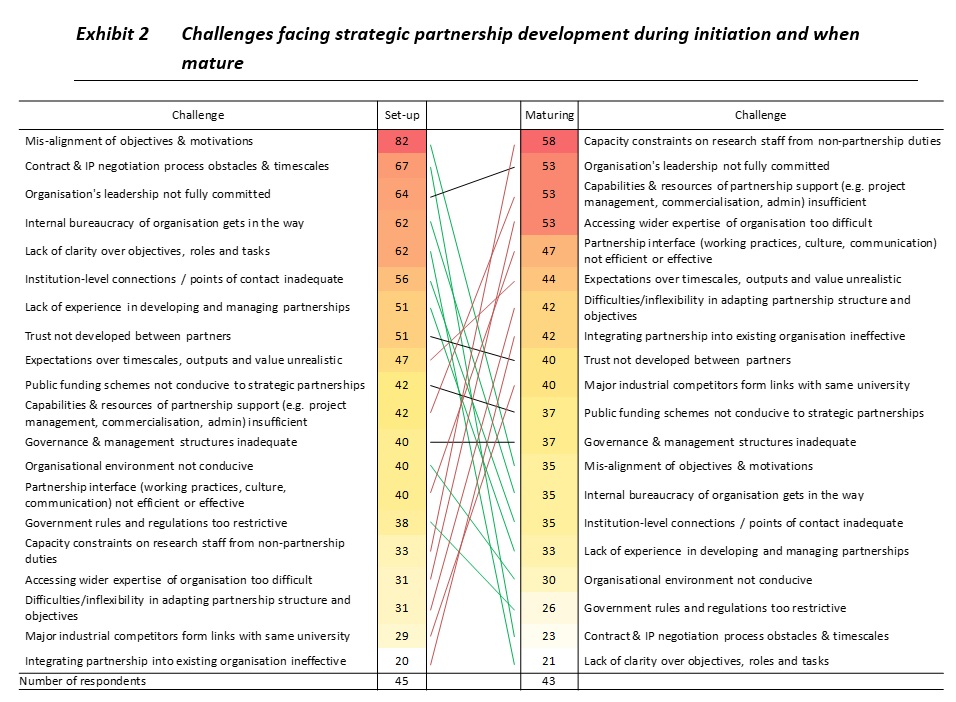Guest blog by Tomas Coates Ulrichsen discussing the impact of strategic university-industry partnerships
Overview
A recent report published by the Centre for Science, Technology and Innovation Policy (CSTI) at the University of Cambridge highlights the growing importance of strategic partnerships – those longer-term and deeper relationships that create more strategic and institution-level links between universities and companies – in unlocking significant additional value from university-industry interactions. Indeed, there appears to be a growing trend by many large research intensive firms – across different sectors – towards consolidating the number of universities they work with. Worryingly, however, for the UK, these decisions are becoming increasingly global, with competition increasing from key emerging economies. It is thus of paramount importance that we understand what more we can do – as a national innovation system – to strengthen our ability to attract and retain these types of high value, longer term investments in the UK.
What is clear is that strategic partnerships must be able to deliver value to each of the different partners involved. They also need to be appropriately and adequately managed, resourced and supported. Perhaps most importantly, they need to be able to adapt, with the support required having to evolve and respond to different and emerging challenges. Challenges around contract and IP negotiations, while important, are but one of many, and are often addressed early on.
The report – authored by Tomas Coates Ulrichsen and Eoin O’Sullivan – brings together the insights and lessons from a major 2014 UK-US workshop on building strategic partnerships organised by CSTI in partnership with PraxisUnico and the US-based University-Industry Demonstration Partnership. It explores what more can be done to enable universities and industrial partners to develop effective and sustainable strategic partnerships.
Strategic partnerships must help to unlock benefits for both companies and universities
Successful strategic partnerships are able to unlock significant benefits for both the companies and the universities involved. Exhibit 1 highlights some of the many ways in which the different types of partners benefit. Indeed, one of the advantages of these partnerships is the ability to realise a multiplicity of reinforcing benefits that would be difficult to secure through individual, shorter term interactions. Truly successful strategic partnerships can also see a stronger long-term coupling and responsiveness between the firm’s strategic R&D and innovation needs and research, education and translational activity within the university. However, it can take time for the full range and scale of benefits to emerge and may only do so after a certain threshold of trust and depth of relationship has been developed.

Strategic partnerships face challenges that change over time: flexibility and evolving support is critical
Strategic partnerships need to be able to adapt to survive and succeed. Foreseen and unforeseen events – within the university or company, the wider industrial system or even the socio-economic and political landscape – can significantly disrupt the partnership and its direction. Their objectives, needs, capabilities, support requirements etc. all evolve over time and as these conditions change.
To unlock the significant additional benefits, the partners involved have to overcome a range of challenges (Exhibit 2). Critically, these challenges evolve over time. The exhibit also clearly highlights the variety of transactional, motivational, relational, capacity and organisational challenges confronted by partners. These go well beyond the much publicised difficulties associated with contracts and IP negotiations. Indeed once these, and other transactional and motivation-related issues, are addressed during the setup phase, they often fall away. Other more relationship and capacity-related factors then emerge that have to be confronted. However, there are a number of barriers that appear to persist. This includes the ongoing commitment of leadership, developing trust between individuals and organisations, the ability to grow and spread, and the suitability of public funding to support partnership activities.

Given the need to adapt to survive, flexibility and the willingness to adapt are particularly important for the success of many strategic partnerships. Part of this requires creating a learning environment that:
- Fosters a strong understanding of not only each others’ needs, but also of their capabilities, working practices and constraints (related to how university-based activity can contribute to innovation within the company).
- Enables partners to explore what does and doesn’t work and experiment in different mechanisms for translating research into productive use
- Allows the value proposition to be developed and adapted
Many of these areas may not necessarily be clear at the outset of the strategic partnership.
Finally, the report highlights a wide range of practical insights and lessons drawing on delegates’ experiences to help make strategic partnerships work during the initiation phase; managing them; and dealing with disruptions and change.
Building our understanding going forward
While our understanding of strategic partnerships has advanced considerable in recent years, there are a number of areas where we believe that further work would be valuable to support the university-industry partnering community. These include:
- Further understanding the value proposition and develop a framework for assessing and measuring success
- Understanding what drives university partner choice to inform policy development in this area and our ability to attract and retain such investments in the UK
- What can be done to strengthen the ability of companies to absorb the knowledge and technologies generated within these partnerships back into their firms
- A more detailed understanding of the nature of support required (beyond contracting & IP support) and how this varies as partnerships mature
- How transitions can be managed and navigated
At CSTI, we are starting to explore these above issues in more detail. For further information or to get involved in the work, please contact Tomas Coates Ulrichsen (tc267@cam.ac.uk).
For more infomation and to take our survey click here.